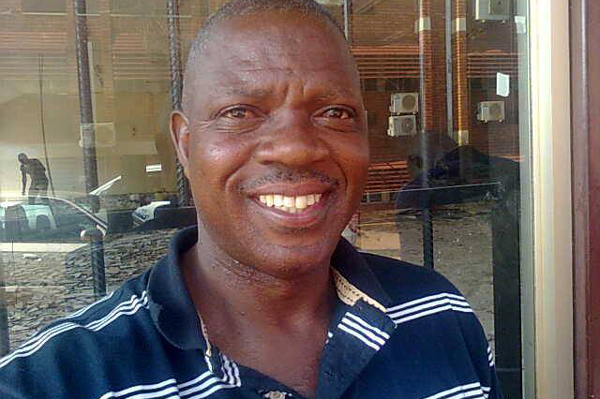
IT never rains, but pours for former Sungura king Mitchell Jambo who moved away from the Zimbabwe musical limelight and settled in South Africa’s Limpopo Province where he is a vendor.
By Tapiwa Zivira
Jambo, who is popularly known for the 1989 hit Vimbiso, sells various wares and CDs, mainly Zimbabwean music CDs at a market place in Thohoyandou. He is one of many local artistes who moved to South Africa in search of greener pastures due to economic hardships.
Ironically, the former Sungura Boys musician is making a living through piracy, which is viewed as having claimed the scalp of the local arts industry.
In an interview with The Standard Style from his South African base last week, Jambo denied selling CDs and insisted he was still playing music.
“I am not selling any CDs, but I am still playing music and doing shows,” he said.
The musician was not keen to talk about his current life, but when quizzed further, he referred questions to one Joseph Soza, who he said is a guitarist with his band.
Soza’s phone was unreachable.
- Chamisa under fire over US$120K donation
- Mavhunga puts DeMbare into Chibuku quarterfinals
- Pension funds bet on Cabora Bassa oilfields
- Councils defy govt fire tender directive
Keep Reading
Further enquiry revealed Jambo occasionally partners with other Zimbabwean musicians for performances at small functions in Musina and Makhado.
One of them is Soza, who was with the Marunga Brothers and now has his own projects.
But for a man of Jambo’s stature, who is one of the few surviving former members of the Sungura Boys, the limelight appears to be shying away from him as he has no new recordings on the market.
He remained virtually in the dark during most of the 1990s, releasing albums that have remained unknown to many.
For the rest of the 1990s, a time that can be said to be the golden era of sungura, musicians like Ngwenya Brothers, Leonard Zhakata, the late Simon Chimbetu, Leonard Dembo and John Chibadura, among others, hogged the limelight, shutting out Jambo who remained known for Vimbiso.
Ten years after Vimbiso, Jambo released Ndini Uyo, which, at 25 minutes, was the longest sungura track ever produced.
He experimented on the song by writing it as a love story in which he was asking various musicians to sing love songs for his estranged lover.
In the song, Jambo mimics the choruses of various musicians like Simon Chimbetu, Oliver Mtukudzi and Thomas Mapfumo, among others.
His experiment worked, the song was an instant hit.

But misfortune was soon to follow him as he was involved in a road accident in which he got injured and lost musical instruments.
Asked about his view of the current crop of sungura musicians, Jambo said they lacked originality.
“My observation of museve music in Zimbabwe is that very few are doing their own creations, except doing what has been done already in the industry,” he said.
He believes young musicians are rushing to produce half-baked music and he still carries memories of Ndini Uyo, which he says took him three years to compose.
But with such views on sungura, Jambo appears not keen to return home, preferring to give vague promises that he will be “home soon for shows”.
Jambo, like most sungura musicians of his era, started his career with Sungura Boys, an outfit put together in the early 1980s. The group was regarded as the “mother band of Zimbabwe’s most popular music genre”.
Nicholas Zakaria and late stars like Simon and Naison Chimbetu, John Chibadura, Ephraim Joe, Tineyi Chikupo and Shepherd Chinyani, among others, rubbed shoulders, then as minnows in a music industry that was dominated by other forms of music like Mapfumo’s Chimurenga and Afro-jazz.
During their time while stationed at Highfield’s Mushandirapamwe Hotel with the Chimbetu brothers doing the lead vocals, the Sungura Boys also included some fresh, but talented musicians who could entertain revellers when the Chimbetus took breaks.
One of them was Jambo, then an unknown young man from Dandazi in Hurungwe.
He recalls the time with excitement.
“I remember in 1983 when [Jamaican reggae star] Don Carlos visited Mushandirapamwe Hotel while I was performing live on stage. During those days I was the one who led reggae sessions during the Chimbetus’ breaks.”
“He [Carlos] came in while I was singing [a cover of] his song Jah Jah Hear My Plea. He was very much excited because I was singing just like him…by the time I went on a break, Carlos came to me and shook my hand. I remember him saying to me ‘Yah man, dem sing dem like me yah, your dem voice is dem good and sweet man, yah, I wish u de best yah man.’ I was so excited,” he said.
Jambo joined the Zimbabwe Chachacha Kings after the eviction of Sungura Boys from Mushandirapamwe Hotel over a move to replace the Chimbetus and bring back John Chibadura as lead vocalist.
The Zimbabwe Chachacha Kings was led by the late David Ziome who had worked with other top musicians like Star Zimunya, Cephas Mashakada and Leonard Dembo and The Outsiders.
As part of the Zimbabwe Chachacha Kings, Jambo hit the right chord in 1989 with his first hit, Vimbiso.
Pushed by the success of Vimbiso, Jambo came together with the late Admire Kasenga who then played the bass guitar to form the Marunga Brothers.
However, Kasenga formed his own group, Ngosimbi Crew, and released hit songs like Masweet Sixteen, Auntie Rhoda and Muchato waTobias.











